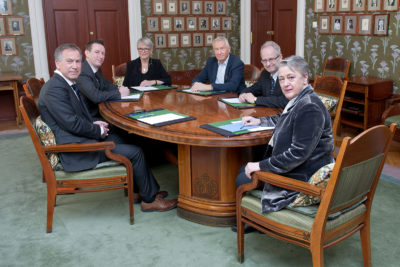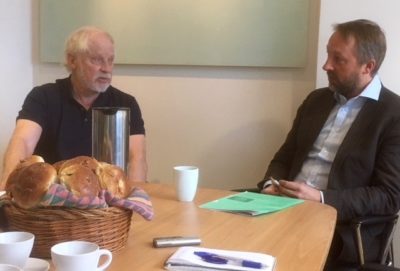With two new members, one of them decribed as “a hard-core realist,” the Norwegian Nobel Committee is believed to have engaged in particularly “hefty debate” this year over who will win the Nobel Peace Prize next week. Speculation among Oslo-based experts on the Peace Prize process has centered on nominees tied to the hard realities of the “MeToo” movement and how sexual violence as a tool of war should be confronted, along with efforts to preserve multilateralism and support refugees.

One of the two new members on the committee, Asle Toje, may well be challenging the idealism that’s long been associated with the Nobel Peace Prize, according to Henrik Urdal, who heads the Norwegian peace research institute PRIO. “He’s a hard-core realist,” Urdal said during a meeting with foreign correspondents in Oslo on Thursday. Toje, a foreign policy researcher and commentator with a doctorate from Cambridge, was selected by the Norwegian Parliament after it had rejected the first choice of the conservative Progress Party that was entitled to nominate a candidate. Under the terms of Alfred Nobel’s will, the political make-up of the Parliament is supposed to be reflected on the committee, and the Progress Party still ended up with a man who’s skeptical about immigration.
The other new member of the committee is Anne Enger, a former head of Norway’s Center Party that champions support for farmers and outlying districts around the country. Known for its protectionist policies and ongoing criticism of the European Union (EU), Enger successfully led the campaign that kept Norway out of the EU in 1994. It’s thus unclear whether Enger would support a prize that might champion multilateralism as a means of maintaining peace in the world.

The other major issue seized upon by Urdal and Norwegian historian Asle Sveen as worthy of Peace Prize attention involves aid for refugees. Urdal and his colleagues at PRIO specifically named five candidates, not meant to second-guess the Nobel Committee but simply those who PRIO thinks are the best candidates known to have been nominated.
The World Food Programme (WFP) topped their list, with hunger once more a major humanitarian challenge in the wake of armed conflicts not least in Syria and Yemen. Urdal noted how the WFP “is ever-present” in aiding displaced people in refugee camps from the Middle East to Africa and Asia. A prize to the WFP would recognize both the importance of multilateralism and the “crucial work the organization is doing for populations fleeing from conflict” and, in doing so, “hopefully pave the way for further conflict prevention measures.”
Next on PRIO’s list is Dr Denis Mukwege, Nadia Murad and Tarana Burke, all of whom have been “leading figures in bringing attention to sexual violence in armed conflict.” Sveen, a Norwegian historian who co-authored a book about the Nobel Peace Prize on the occasion of its 100th anniversary in 2001, supported this choice for a Peace Prize, not least as a way of acknowledging the “MeToo” movement. Both noted how MeToo was nominated by Norway’s Labour Minister Anniken Hauglie, who pointed out that rape is consciously used in war and women are used as human shields. Women became sex slaves in the Balkan War, for example, and have been used most recently by the terrrorist group IS in the Middle East and by Boko Haram in Nigeria.
PRIO also thinks a joint prize to SOS Méditerranée, Doctors Without Borders and the International Rescue Committee (IRC) would help maintain public attention on the migration crisis and those trying to help those fleeing war and poverty. The IRC in particular helps provide emergency health care “on the ground in Libya,” where migrants assemble and endure often inhumane conditions before attempting to cross the Mediterranean in small boats, risking their lives in the process.
PRIO’s two other choices as among the best candidates for a Nobel Peace Prize include a joint prize to Oby Ezekwesili, one of the founders of Transparency International, and the Extractive Industries Transparency Initiative (EITI), for their work in fighting corruption and the conflicts it can create around extraction of valuable natural resources. “Natural resources, transparency, corruption and conflict are intrinsically linked,” writes PRIO, making the “important work by individuals and organization like Ezekwesili and EITI deserving of attention.”
Reporters Without Borders (RSF) was also highlighted by PRIO because of the “importance of providing reliable information from the conflict theaters of the world” and “holding conflict actors accountable.” While independent reporting and press freedom have not yet been the focus of the Nobel Peace Prize, PRIO notes that reporters all over the world are putting their own health and safety at risk to provide information from the most devastating conflicts and repressive regimes. Misinformation in wars abounds, while the press has been under enormous pressure from Turkey to Myanmar to the US. PRIO specifically cited how RSF has spoken out against the recent sentencing in Myanmar of reporters for Reuters for revealing atrocities against Myanmar’s Rohingya minority.
The five members of the Nobel Committee who now represent the political spectrum from right to left may have found common ground on any of the candidates mentioned. Sveen all but ruled out specualtion over a prize to Korean leaders for their recent peace talks, claiming the committee will “remember its mistake” on an earlier occasion. He also doubts any prize will go to a Russian civilian organization because of the current political tensions between Norway and Russia.
Any prize to a Chinese human rights or pro-democracy organization, or a nominee defending China’s Uighur minority, “would really underline the independence of the committee,” Sveen noted, but he finds that unlikely, too. The Nobel Committee made its point in its Peace Prize to Chinese dissident Liu Xiaobo in 2010 that infuriated the Chinese and led to a lengthy diplomatic freeze between Norway and China that was only resolved last year. Chinese leaders still denied a visa to the leader of the Nobel Committee, Berit Reiss-Andersen, as late as last year.
The committee’s decision on this year’s Nobel Peace Prize will be announced next Friday, October 5.
newsinenglish.no/Nina Berglund

